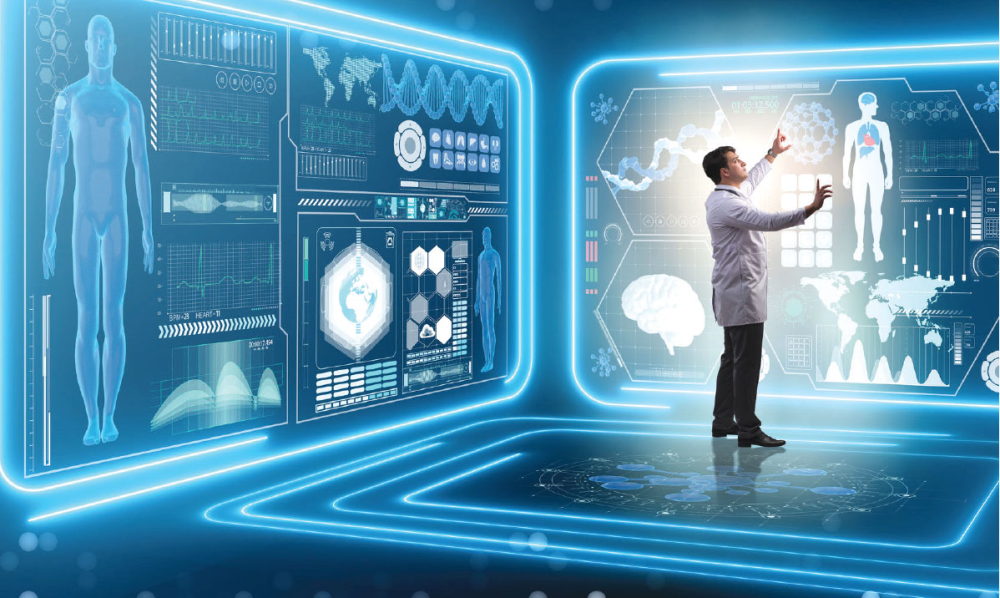Artificial Intelligence (AI) is a branch of computer science that studies and creates machine systems to simulate intelligent human behavior and critical thinking, to complete certain tasks without much human intervention. AI is being applied in all industries such as education, healthcare, finance and banking.
AI opens a new era for the healthcare industry with great potential to influence young people's career choices and reshape traditional job roles. Digital transformation is not only a trend but also an inevitable requirement to improve the quality of healthcare services.
In response to the urgent needs of the labor market, Hong Bang International University (HIU), a multidisciplinary university with a strong medical sector, organized a workshop on "Training Improvement and Scientific and Technological Cooperation" with the participation of Military Hospital 175 , Pharmacity, FPT Long Chau, BuyMed... to co-design programs, share resources and jointly develop applied technology. At the Bethoven Hall of HIU, a discussion session on "Pharmacists in the AI storm - Choose to be replaced or master the game" also took place, attracting the attention of many students and businesses. The speakers pointed out that artificial intelligence is opening up new directions in the pharmaceutical industry, from drug research to drug dispensing robots, medical records storage and customer care.
AI in medicine can be divided into two categories: Virtual and physical. The virtual part includes applications from electronic health records, appointment scheduling, online registration, follow-up reminder calls, vaccination scheduling to algorithms for calculating drug dosages as well as warnings of adverse effects in prescriptions, neural network-based guidelines in the process of making treatment decisions. The physical part involves robots that assist in performing surgery, smart prosthetics for the disabled and elderly care... For example, the robotic surgery system, the system's robotic arms mimic the surgeon's hand movements with better accuracy, with a 3D view that allows for delicate incisions.
Cho Ray Hospital has signed a cooperation agreement with Bach Mai Hospital to digitally transform towards a smart, sustainable healthcare system. The digital medical examination process includes online appointment booking, direct doctor examination and prescription, the machine has deducted the amount of medicine in stock and transferred to insurance for payment. Cho Ray Hospital also introduced AI applications in new techniques in diagnosis such as blood cell image analysis, RCA-T cell immunotherapy and algorithmic interpretation of pathology results to help save time, improve accuracy, and screen for diseases even when there are no symptoms.
In the pharmaceutical industry, integrating AI into the research process shortens drug development time from years to months, provides therapies by simulating chemical reactions and predicting treatment methods, and uses robots to weigh medicinal materials, package, and dispense drugs in preparation.FPT Group manages drug quality with near-real-time data, digitizes the entire drug supply chain, and assigns identification codes to each product. Boston Pharma applies digital technology synchronously to distribution and customer care with AI voicebot, checking product origin through UID codes. Pharmacity integrates AI in customer care, increasing transparency and effectively preventing counterfeiting. AI promotes innovation in the healthcare industry, specifically new technologies such as drug dispensing robots, call centers, and building effective digital management methods. In addition to the potential to improve the quality of health care, reduce treatment costs for people, and expand access to medical services in remote areas, the Vietnamese health sector faces challenges from AI to the market in terms of finance and law. Traditional private enterprises have not dared to invest in robots for dispensing medicine, operating call centers, and tracing product sources. Traditional pharmacy pharmacists would like to thank the Ho Chi Minh City Department of Health on the Department's Information Portal for having a link to look up practice certificates, drug registration numbers, functional foods, medical equipment, and product traceability to advertising content to help pharmacists have a firm grasp of the law and practice with confidence. Pharmacy Law No. 44/2024/QH15, effective from July 1, 2025, allows e-commerce of health protection products, but how to sell them in accordance with legal regulations to protect consumers' health and ensure safety in pharmaceutical business requires specialized knowledge of pharmacology and management. AI is opening up new directions for the pharmaceutical industry, from formulation to drug use consultation and medical record storage, customer care. In business, in just a few minutes, AI can write a product brochure from introducing the origin, ingredients, uses, AI can program robots to dispense medicine and be online at the pharmacy 24/7.
The limitation of AI is that artificial intelligence only has IQ intelligence but not EQ emotions like humans. Therefore, humans are still needed to take care of and comfort patients, receive inspection teams and take legal responsibility. After the robot has finished mixing the medicine, the pharmacist will sign the test report and respond to the inspector.
From diagnosis, paraclinical testing, internal medicine treatment plan to surgical robotic skills, AI is more accurate than humans. Therefore, humans need to learn technology to understand and manage the machine.
To use AI in healthcare, managers need to focus on integrating AI into existing processes, ensuring high-quality data, training medical staff to use the machine and ensuring patient confidentiality. In addition to learning digital skills, future doctors and pharmacists still need a solid foundation of professional knowledge and professional qualities such as responsibility, integrity and communication skills - these factors cannot be replaced by machines.
Despite being modern and intelligent, AI still has a weakness in security. The system can be vulnerable to cyber attacks through loopholes in algorithms, leading to the risk of data breaches and security threats such as theft of personal information, sensitive information, and creating sophisticated phishing attacks. To protect patients, it is necessary to train AI users to be aware and responsible when using technology, comply with ethical and legal principles, respect privacy, and protect personal data. Decree No. 102/2025/ND-CP, effective from July 1, 2025, is an important legal basis to create consistency and synchronization of contents on creating, collecting, connecting, sharing, using, and managing medical data.
Current medical training programs need to change to equip students with the necessary skills to work effectively with AI technology. All HIU lecturers have AI certificates. With AI, lecturers do not need to give students a week to prepare a presentation, but only need 30 minutes to handle a complex clinical case. Students present their preparation, lecturers correct it in 10 minutes, so the lecturer, in addition to the medical expertise accumulated over many years, also needs to be able to quickly search for documents in a very short time, selecting cross-information between many subjects in the field from accurate sources.
Currently, with the needs of society, more medical schools are opening and there are high job opportunities with attractive salaries, so the number of students applying is large. The characteristic of the medical field is that in addition to academic theoretical knowledge, students must be good at their profession, so they should choose a school that trains digital technology skills. AI can support the provision of medical expertise resources and optimize treatment regimens, but cannot replace the role of doctors and pharmacists in health care. Because humans are different from machines in their ability to interact, empathize and understand. Proactively learning, developing skills, and adapting to change will help workers succeed in the digital age.
Facing the strong wave of digital transformation in the field of Medicine and Pharmacy, HIU has identified three key strategies: improving the training program in a streamlined and practical direction; enhancing technology skills, critical thinking for students and expanding deep cooperation with businesses. Because employers require human resources with good expertise and technology skills, the school is promoting inviting lecturers from businesses to teach, developing an AI-integrated simulation system and promoting joint research products. In the pharmacy management program, there are instructions for students on how to access links to trace product sources and look up drug interactions. The school aims to increase the practice rate to 25 - 40% according to international standards, aiming at training according to real output capacity.
On the occasion of the 2025 enrollment season, I would like to tell young people who love the medical profession: Don’t be afraid of AI, but only be afraid of people who are better at AI than you. You need to select the right information and cultivate compassion. With a doctor or pharmacist degree in hand, you have the master key to open the door to life, but you must always remember the Hippocratic oath: “I will guide all good regimes for the sick”./.
DSCKII. Ly Thi Nhat Dinh
Source: https://baolongan.vn/tri-tue-nhan-ta-oa-nh-huong-ng-the-na-o-de-n-vie-c-cho-n-nghe-cham-so-c-su-c-kho-e-a198593.html




![[Photo] Prime Minister Pham Minh Chinh receives President of Cuba's Latin American News Agency](/_next/image?url=https%3A%2F%2Fvphoto.vietnam.vn%2Fthumb%2F1200x675%2Fvietnam%2Fresource%2FIMAGE%2F2025%2F12%2F01%2F1764569497815_dsc-2890-jpg.webp&w=3840&q=75)













































































































Comment (0)